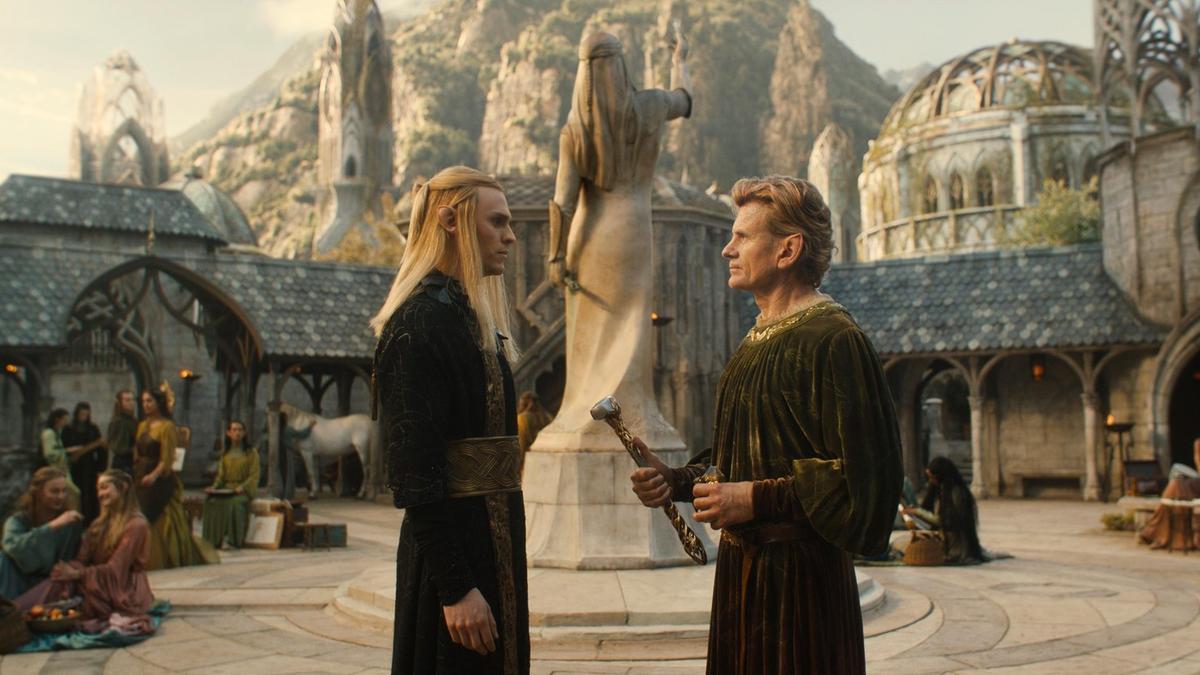
The final episode of “The Rings of Power’s” second season may have left some questions unanswered and Tolkien purists somewhat unsatisfied, yet it achieved a grander feat: transforming the series from what initially seemed like a billion-dollar gamble into a robust and dynamic narrative of Middle-earth. From a shimmering, somewhat unsteady attempt to rekindle Tolkien’s world, the show has evolved into a narrative that is not only richer and bolder but unexpectedly confident. After tiptoeing through its first season amidst grand expectations, the showrunners have now immersed themselves fully in the vast scale and lore of the source material, delivering an epic crescendo that resonates deeply with audiences.
This second season responds thoughtfully to the critiques of its predecessor, with the finale serving as a testament to its refined direction. While season one exhibited all the elements characteristic of a large-scale TV spectacle—vast landscapes, pristine CGI, and the heavy weight of Tolkien’s enduring legacy—it somehow felt enclosed within its own aspirations. However, with a slight nudge from a benign, if not misunderstood, Dark Lord, the series has finally shed those innovative restrictions.
Characters and narratives that previously appeared tangential now converge, enhancing the series’ core themes of power, corruption, and the seduction of evil. The result is a more cohesive narrative, though there remains room for growth. This season, Sauron’s ominous presence expands noticeably. Charlie Vickers embodies “the great deceiver” with a deceptively charming persona, epitomizing slow-burn villainy at its best. In contrast, Charles Edwards’ Celebrimbor stands as an entrancing visionary blinded by his faith and ambition, allowing Sauron’s noose to tighten unnoticed. Their interactions form a tragic dance of trust and deceit, with Edwards’ subtle unraveling brilliantly counterpointing Vickers’ dark enigma. When Sauron’s true nature unfolds, the sensation is akin to a steadily intensifying pressure, transforming “The Rings of Power” into an intimate psychological tragedy cloaked in monumental stakes.
A still from ‘The Rings of Power’ Season 2 | Photo Credit: Amazon Prime Video
The climactic, battle-centric conclusion of the series delivers the visual marvel fans expect, often surpassing competing fantasy series. Whether depicting the radiant aftermath of conflicts in Eregion or the thunderous discord with Durin’s Bane in Khazad-dûm, the finale’s visuals are extraordinary. Yet, amid the fiery weapons and collapsing citadels, the story remains anchored by emotion, particularly seen in the tender yet fleeting bond between Prince Durin IV (played by Owain Arthur) and his father, King Durin III. Their strained father-son dynamic, shaped by duty and enduring pride, adds a human touch to the narrative, even as Balrogs and mithril take center stage.
In a landscape where many new fantasy series cautiously dabble in realism, “The Rings of Power” shines in the ethereal splendor of Middle-earth.
. It invites viewers to undergo a sense of awe at the world’s wonders—ranging from the radiant lights of Valinor to the dangerous glow of molten mithril, evoking a sense of historical weight. There exists a purity in this world, an unwavering commitment to preserving its magic without succumbing to desire for mere prestige. Even when the plot occasionally stumbles, the grandeur endures.
It’s in this context the show’s magic truly sparkles. While “The Rings of Power” may not cater to all tastes, especially to those yearning for the gritty tones of other realms like Westeros, it offers an alternative: a rekindling of the wonder that fantasy once held. It urges us to remember the feeling of believing in the extraordinary, to lose ourselves in a world where the stark battle between good and evil persists—complete with all its beauty, danger, and allure.
From Lindon’s golden forests to the sandy landscapes of Rhûn, the series never ceases to captivate. However, despite its triumphs, the show continues to contend with certain deficiencies. The Harfoots, largely overlooked in the finale, remain somewhat detached from the primary narrative, seemingly added to inject a trace of whimsy into an increasingly dark realm. It’s uncertain how featured they’ll be in future seasons.
The eloquent conclusion of Sam Hazeldine’s portrayal of Adar bears poetic weight but leaves viewers with a bittersweet sensation, knowing his exceptional role won’t be revisited. Nonetheless, viewers were treated to a predictable “Grand-Elf” reference, albeit a payoff long overdue.
As the second season draws to a conclusion, it’s evident that “The Rings of Power” has absorbed lessons from previous missteps. It shows increased confidence in storytelling, a stronger grasp of character development, and an openness to embrace the vast lore of Middle-earth. Although it may forever face comparison with Peter Jackson’s films, the series forges a distinct identity. Middle-earth has regained its status as a realm filled with marvel, peril, and irresistible charm, for which we can only be thankful.
All episodes of The Rings of Power are available for streaming on Amazon Prime Video.












